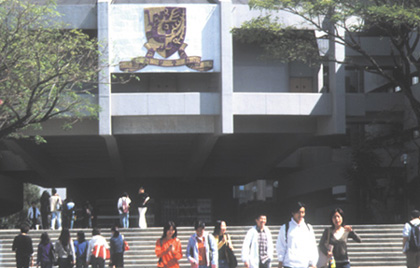|
Phoebe
Wong

Part-time instructors excel in practical skills rather than theory.
Students
doubt calibre of part-time instructors at universities
By Phoebe Wong
Part-time lecturers’ qualifications, availability, and calibre
are hotly discussed among university students.
For example, some students are dissatified when part-time instructors
leave campuses immediately after class.
The Department of Social Work at The Chinese University of Hong
Kong is one of the departments recruiting part-time instructors.
Prof. Ma Lai Chong, the department head, said, “Part-time instructors
can cover areas that full-time lecturers cannot.”
She cited training for rehabilitation service as an example.
Said she: “It is an important aspect in social work. Yet, there
is a lack of full-time lecturers specialising in this field.
“Recruiting part-time instructors is a solution. In this way,
we can also have more lecturers with different specialties.”
Moreover, the relatively low cost is also an advantage.
“We only offer $660 per hour, which is far below that of a full-time
lecturer.
“Also, fringe benefits — for instance, a housing allowance — need
not be provided.”
This may be the reason why some part-time instructors do not aim
at earning money.
The news editor of Cable News Channel, Mr. Brian Wong, is one
of them.
He teaches news writing in the Department of Journalism at Hong
Kong Baptist University.
Said he: “I like to share my experiences with students so that
they can grasp some practical techniques of this field.”
Mr. Tsang Lap Ki is a part-time teacher of public relations in
the School of Journalism and Communication at the Chinese University.
He is the managing director of Strategic Financial Relations Limited.
Because Mr. Tsang completed only a bachelor’s degree in journalism
and communication, he said he found it difficult if a course is
totally theoretical.
However, he said, “I provide them with first-hand information.”
He thinks part-time lecturers excel in practical terms, especially
in crises management in the public relations industry.
Said he: “A part-time instructor can keep close contact with the
industry.”
Another part-time instructor, Miss Lau Yuk King, is working in
the Department of Social Work at the Chinese University.
She thinks that part-time lecturers have more freedom.
Unlike full-time staffers, they are not burdened with research
and administrative tasks.
Said she: “Being a full-time professor is a demanding job because
universities are getting more market-oriented.”
She pointed out that full-time professors were involved in marketing
and promotion aiming to attract students and to avoid cutting resources.
Also, most full-time professors study and strive for breakthroughs.
This is, however, too tiresome for her.
This may explain why Prof. Ma said the department could not only
employ part-time instructors.
She said, “We still need committed core staffers who understand
the administrative proceedings thoroughly.”
Regarding the assessment of the performance of part-time instructors,
Prof. Ma said she examined their course outlines and assignments.
Besides, feedback from postgraduates being taught by part-time
instructors can also serve as guidance.
She said that postgraduates knew what they really wanted and were
willing to identify any problems.
It is believed that high quality part-time lectures are hard to
find. Prof. Paul Lee is the director of the School of Journalism
and Communication at the Chinese University.
Said he: “We recruit according to our knowledge and others’ recommendations.
“We put most of our emphasis on one’s expertise.”
He said the Chinese University requires part-time instructors
to have a bachelor’s degree or above.
He can still consider people without bachelor’s degrees, but they
must have extensive experience and brilliant performance in their
fields.
He added that one’s personality is also useful for assessment.
Some part-time instructors are invited by the departments they
got their degrees in. Mr. Tsang is one of them.
Though he is not a specialist in theory, it is lucky that the department
gives him a lot of freedom in curriculum design. He has tried to
make each lesson like an independent lecture.
Mr. Tsang said that communication with students had been improved
in the past 2 years by the use of e-mail. 
|
 Online
Edition
Online
Edition